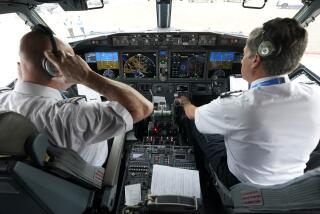FAA to Require Pilots and Crews to Take Alcohol Tests
- Share via
WASHINGTON — The Federal Aviation Administration soon will require pilots and crews to take blood-alcohol tests when requested by authorities or face the loss of flight certification and civil penalties, officials said Wednesday.
The rule, which will take effect April 9, affects all airline, cargo and private flight crews.
The FAA said that general aviation--mainly private planes and company aircraft--has the worst alcohol problem.
“Although significant progress has been made in recent years in reducing the number of alcohol-related general aviation accidents, we believe additional gains are possible through continued education and more stringent enforcement action,” Secretary of Transportation Elizabeth Hanford Dole said.
Fatal Accidents Cited
In 1971, alcohol use was a factor in 12.6% of all fatal general aviation accidents, the FAA reported. In 1984, that figure had dropped to 4.8%.
FAA regulations forbid people to fly planes within eight hours after consuming alcohol.
Air crews are considered legally drunk if they have a blood-alcohol content above 0.04%, contrasted with the 0.1% level for drivers in most states.
Spokesman Edmund Pinto of the Aircraft Owners and Pilots Assn., which represents general aviation pilots, predicted the group’s members would favor the rule.
The FAA on Wednesday also ordered airlines to carry acute-emergency medical kits, beginning Aug. 1. The kits, which would supplement conventional first-aid supplies, must contain equipment and drugs to treat heart attacks, insulin shock, allergic reactions and other emergencies.
The FAA said the kits cost about $100 each.
The rule also requires the airlines to keep track of all medical emergencies for the next two years.
More to Read
Inside the business of entertainment
The Wide Shot brings you news, analysis and insights on everything from streaming wars to production — and what it all means for the future.
You may occasionally receive promotional content from the Los Angeles Times.










